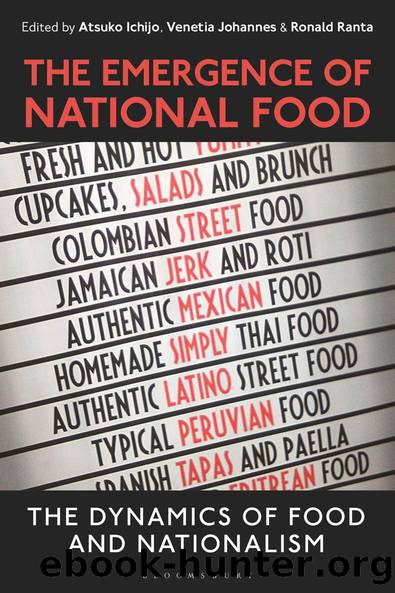The Emergence of National Food by Atsuko Ichijo Venetia Johannes Ronald Ranta

Author:Atsuko Ichijo, Venetia Johannes, Ronald Ranta [Atsuko Ichijo, Venetia Johannes, Ronald Ranta]
Language: eng
Format: epub
Tags: Nonfiction, Social & Cultural Studies, Social Science, Cultural Studies, Customs & Traditions, Sociology
ISBN: 9781350074156
Publisher: Bloomsbury Publishing
Published: 2019-02-21T05:00:00+00:00
9
Ethnicity, Class, and Nation in the Chilean Cuisine
Isabel M. Aguilera Bornand
Introduction
After the end of a long dictatorship, Chile began a political transition marked by the desire to build a nation inclusive of not only the political opponents openly expelled from society, but also the plurality of âcultural identitiesâ present in the national territory. In this context, cuisine became an important showcase to display the nation in the making. It is a diverse nation which was leaving behind a foundational myth based on rurality, peasantry, and miscegenation in central Chile. Between 1994 and 2000 the State strongly supported the process known as the renewal of Chilean cuisine. This meant that multiple indigenous and regional products, unknown until then, gained a place in the domain of sophisticated and haute cuisine. At the same time, journalists and academics turned their attention to gastronomy and its relation to national culture, resulting in publications and reprintings of books dealing with Chilean cuisine. Both these publications and the discourses of the State and chefs seemed to indicate that, by the beginning of the twenty-first century, the notion of Chilean cuisine had changed significantly. However, when close attention is paid to the voices of the diners, it is possible to observe that the view of the Chilean cuisine as a reflection of national diversity is not at all hegemonic.
The discourse of consumers expressed on the website TripAdvisor, collected through netnographic techniques (Kozinetz, 1998; Bernard, 2004), confirms that the rural-traditional imaginary connected with central Chile does not activate a generalized identification any longer. Its replacement is not, however, an ethnicized version of Chileanness nor is it a turn toward multiculturalism. To the contrary, social class and certain aspects of urban life emerge as those elements that can represent the community.
Thus, two versions of Chilean cuisine have been formulatedâon the one hand, the one defined by diversity and originating in the circle of professionalized and specialized gastronomic agents; on the other, the version of the consumers which centers around popular urban culture.
In my research I have privileged the analysis of public discourses to work in accordance with the definition of cuisine as an ideological political artefact. Consequently, besides observations in restaurants and interviews with gastronomic actors, I have also resorted to multiple secondary sources. The material informing the first part of this chapter comes from the analysis of written press, television programs, and books. The second part is informed by a netnography (Ardèvol et al., 2008; Bernard, 2004; Caliandro, 2014) and the use of unobtrusive data collection techniques (Hine, 2011). In order to know the view of consumers regarding their experiences with Chilean cuisine, I have collected and analyzed textual qualitative data in the form of reviews on TripAdvisor.1 In other words, I have analyzed the interpretation consumers make of their own consumption acts, which makes up a particular type of narrative (Vásquez, 2012) that can be studied through discourse and content analysis (Scaraboto et al., 2012). A total of 533 reviews were downloaded, which referred to all those
Download
This site does not store any files on its server. We only index and link to content provided by other sites. Please contact the content providers to delete copyright contents if any and email us, we'll remove relevant links or contents immediately.
Cecilia; Or, Memoirs of an Heiress — Volume 1 by Fanny Burney(31333)
Cecilia; Or, Memoirs of an Heiress — Volume 3 by Fanny Burney(30934)
Cecilia; Or, Memoirs of an Heiress — Volume 2 by Fanny Burney(30889)
The Great Music City by Andrea Baker(21313)
We're Going to Need More Wine by Gabrielle Union(18074)
Bombshells: Glamour Girls of a Lifetime by Sullivan Steve(13109)
Pimp by Iceberg Slim(12931)
All the Missing Girls by Megan Miranda(12750)
Fifty Shades Freed by E L James(12451)
Norse Mythology by Gaiman Neil(11883)
Talking to Strangers by Malcolm Gladwell(11879)
Crazy Rich Asians by Kevin Kwan(8349)
Mindhunter: Inside the FBI's Elite Serial Crime Unit by John E. Douglas & Mark Olshaker(7834)
The Lost Art of Listening by Michael P. Nichols(6474)
Enlightenment Now: The Case for Reason, Science, Humanism, and Progress by Steven Pinker(6406)
Bad Blood by John Carreyrou(5769)
The Four Agreements by Don Miguel Ruiz(5511)
Weapons of Math Destruction by Cathy O'Neil(5037)
We Need to Talk by Celeste Headlee(4870)
